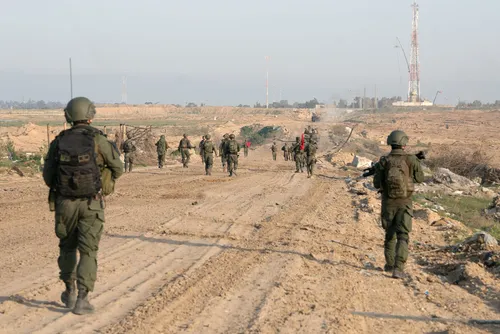
The United States is against Israel’s plans to reoccupy the Palestinian territory of the Gaza Strip after the current crisis, the country’s Secretary of State, Antony Blinken, said this Friday (23).
“I have not seen the plan. There are some basic principles that we laid out many months ago. It cannot be a platform for terrorism and there must be no Israeli re-occupation of Gaza. The size of the territory of Gaza must not be reduced,” he said during a brief visit to Argentina.
The Israeli plans were released by its Prime Minister, Benjamin Netanyahu, on Thursday. It includes “complete demilitarization” of Gaza, new administrations for civilian life and the educational system in the Palestinian territory and the closure of the border with Egypt via the city of Rafah. All supervised by the Israeli government.
The proposal also describes who should govern the Gaza Strip. It also foresees the end of the activities of the UN agency that helps Palestinian refugees, UNRWA. Israel had accused the body of supporting the Hamas attacks on October 7 that killed more than a thousand Israelis.
In its plan, Israel also states that it does not accept the international community imposing a two-state solution – a scenario to which the country had already agreed, but backtracked. In practice, it would officially bury the idea of a free Palestine.
Analysis
Netanyahu’s plan was promptly criticized by Mahmoud Abbas, president of the Palestinian Authority – an entity that in theory would govern the West Bank, but is subjugated by Israel, which even controls the movements of its leaders through Palestinian territory.
“If the world wants security and stability in the region, it must end the Israeli occupation of the Palestinian territories and recognize the independent Palestinian state with Jerusalem as its capital,” said a spokesman for Abbas.
Analyst Arturo Hartmann says the plan “makes explicit that there will not be a Palestinian state.” But there are other points to pay attention to.
“It would also reconfigure demographics, territorial distribution. What would happen to the more than a million people currently in Rafah? The plan calls for new administrators other than Hamas [grupo que governa Gaza desde 2007]nor the Palestinian Authority”, he continues.
“In other words, it intends to create a new elite, new actors that collaborate with the Israeli occupation. Preventing the action of the UN agency is a blow against the refugee status that the Palestinians have, and thus exempts Israel from recognizing the right of return – as stated in a UN decision – or even pay compensation.”
“In this way, Israel is undermining the practical possibilities, forums and institutions, for Palestinians to seek recognition for their cause”, he concludes.
Negotiations
This Friday, Israeli bombings against Rafah and Khan Yunis continued, bringing the total number of Palestinians murdered since October to close to 30,000.
Gaza Strip / Brazil in fact
Meanwhile, representatives of Israel’s secret service, the Mossad, and its internal intelligence agency, the Shin Bet, meet in Paris with Hamas envoys to negotiate a ceasefire.
This week, international calls grew for a truce in the bombings to exchange hostages and bring in humanitarian aid, but last Tuesday the US vetoed yet another UN resolution that determined the pause.
Editing: Nicolau Soares

Source: www.brasildefato.com.br

